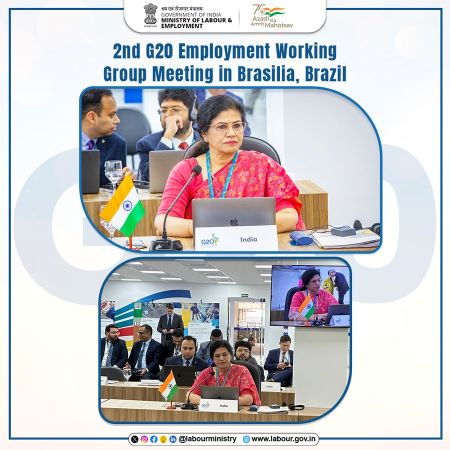India at G20 2nd Employment Working Group Meeting at Brasilia
The two day 2nd Employment Working Group (EWG) meeting under the
Brazilian Presidency commenced today in Brasilia. The G20 EWG’s mandate is to
address labour, employment and social issues for strong, sustainable, balanced
and job-rich growth for all. As India is a member of the G20 Troika,
represented by Sumita Dawra, Secretary, Labour & Employment, India is
co-chairing the 2nd EWG meeting, along with Brazil and South Africa. The Indian delegation
also comprises Rupesh Kumar Thakur, Joint Secretary, and Rakesh Gaur, Deputy
Director from the Ministry of Labour & Employment.
The opening session began with speech of the
Brazilian Minister of State for Labour and Employment, Luiz Marinho. Following
this, in her opening remarks, Ms Sumita Dawra, noted that the priority areas of
the 2nd EWG at Brasilia
align with the priority areas and outcomes of previous G20 presidencies
including Indian presidency, and commended the continuity in the multi-year
agenda to creating lasting positive change in the world of work. This not only
sustains but also elevates the work initiated by the EWG during the Indian
Presidency.
The focus areas for the 2nd EWG meeting is on (i) creating quality employment and
promoting decent labor; (ii) addressing a just transition amidst digital and
energy transformations; (iii) leveraging technologies to enhance the quality of
life for all; (iv) the emphasis on gender equity and promoting diversity in the
world of employment for inclusivity, driving innovation and growth.
On the first day of the meeting, deliberations were held on the
over-arching theme of promotion of gender equality and promoting
diversity in the workplace. The Indian delegation emphasized the need
for creating inclusive environments by ensuring equal representation and
empowerment for all, irrespective of race, gender, ethnicity, or socio-economic
background.
In this context, Indian delegation elucidated significant
strides taken by India in promotion of (i) gender equality
in the workplace and beyond; (ii) steps taken for migrant workers; (iii)
promoting reemployment of senior citizens, (iv) participation in work force of
the differently abled and the marginalised. Some of these achievements
showcased at day 1 of the 2nd EWG are the following:
1. To increase female
labour force participation, India has enacted Occupational Safety
Health and Working Conditions Code, 2020 which entitles
women to be employed in all establishments for all types of work with their
consent at night time. This provision has already been implemented in
underground mines.
2. In 2017, the
Government amended the Maternity Benefit Act of 1961, which increased the
‘maternity leave with pay protection’ from 12 weeks to 26 weeks for all women
working in establishments employing 10 or more workers. This is expected to
reduce the motherhood pay gap among the working mothers.
3. To aid migrant
workers, India’s innovative policy 'One Nation, One Ration Card' allows
migrants to access their entitled food grains from anywhere in the Public
Distribution System network in the country. We have also implemented multiple
schemes to provide social security and welfare benefits while ensuring
portability across states. These schemes provide for affordable
housing, enhanced employability through skill development and old-age pension
to such workers.
4. A landmark step in
fostering inclusion in the workforce is the e-Shram portal, launched
to create a national database of unorganized workers, especially migrant and
construction workers. This initiative, providing the e-Shram card, enables
access to benefits under various social security schemes. The portal allows an
unorganised worker to register himself or herself on the portal on
self-declaration basis, under 400 occupations in 30 broad occupation sectors.
More than 290 million unorganised workers have been registered on this portal
so far.
5. India has also taken
several steps to promote the participation of aged persons in the labour
market; for the rehabilitation of persons with disabilities, including
vocational training, skill development, and job placement services; & for
traditionally marginalized and vulnerable groups.
On Day 2, the 2nd EWG will carry forward the agenda for
discussions.


